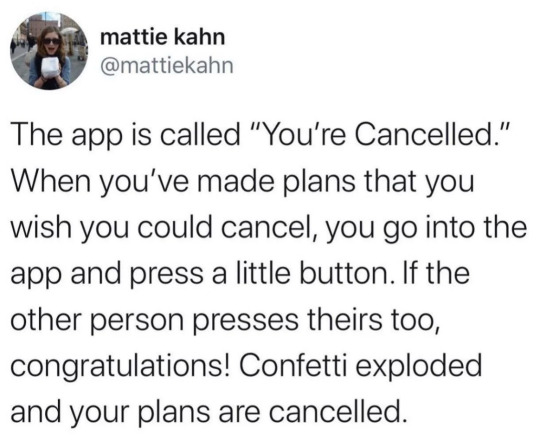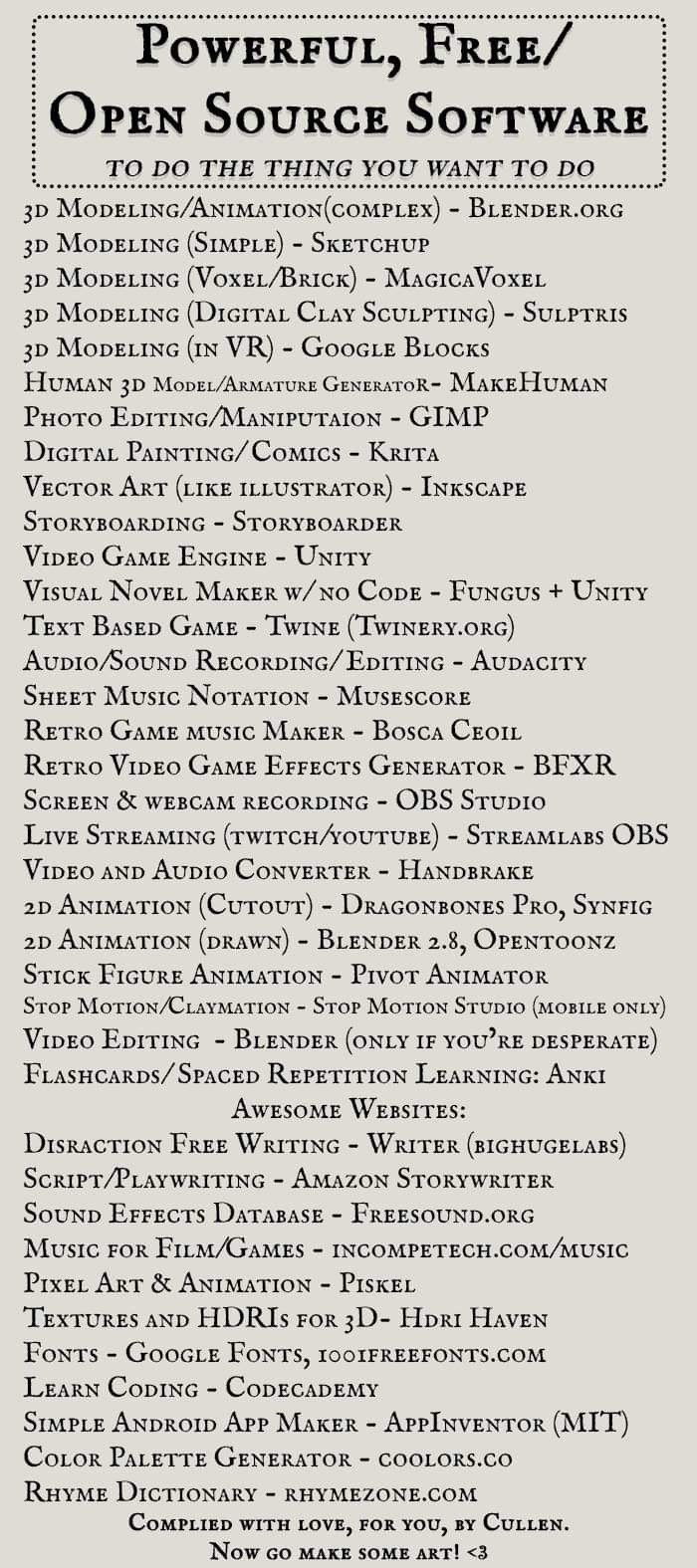#APPs
Text

#memes#meme#apps#technology#internet#ryan gosling#2000s#2020s#millennial memes#twitter#millennials#aol#newgrounds#twitter posts#miniclip#myspace#livejournal#kane52630#posts
23K notes
·
View notes
Text
Me anytime an app changes its layout

4K notes
·
View notes
Text
How lock-in hurts design

Berliners: Otherland has added a second date (Jan 28) for my book-talk after the first one sold out - book now!

If you've ever read about design, you've probably encountered the idea of "paving the desire path." A "desire path" is an erosion path created by people departing from the official walkway and taking their own route. The story goes that smart campus planners don't fight the desire paths laid down by students; they pave them, formalizing the route that their constituents have voted for with their feet.
Desire paths aren't always great (Wikipedia notes that "desire paths sometimes cut through sensitive habitats and exclusion zones, threatening wildlife and park security"), but in the context of design, a desire path is a way that users communicate with designers, creating a feedback loop between those two groups. The designers make a product, the users use it in ways that surprise the designer, and the designer integrates all that into a new revision of the product.
This method is widely heralded as a means of "co-innovating" between users and companies. Designers who practice the method are lauded for their humility, their willingness to learn from their users. Tech history is strewn with examples of successful paved desire-paths.
Take John Deere. While today the company is notorious for its war on its customers (via its opposition to right to repair), Deere was once a leader in co-innovation, dispatching roving field engineers to visit farms and learn how farmers had modified their tractors. The best of these modifications would then be worked into the next round of tractor designs, in a virtuous cycle:
https://securityledger.com/2019/03/opinion-my-grandfathers-john-deere-would-support-our-right-to-repair/
But this pattern is even more pronounced in the digital world, because it's much easier to update a digital service than it is to update all the tractors in the field, especially if that service is cloud-based, meaning you can modify the back-end everyone is instantly updated. The most celebrated example of this co-creation is Twitter, whose users created a host of its core features.
Retweets, for example, were a user creation. Users who saw something they liked on the service would type "RT" and paste the text and the link into a new tweet composition window. Same for quote-tweets: users copied the URL for a tweet and pasted it in below their own commentary. Twitter designers observed this user innovation and formalized it, turning it into part of Twitter's core feature-set.
Companies are obsessed with discovering digital desire paths. They pay fortunes for analytics software to produce maps of how their users interact with their services, run focus groups, even embed sneaky screen-recording software into their web-pages:
https://www.wired.com/story/the-dark-side-of-replay-sessions-that-record-your-every-move-online/
This relentless surveillance of users is pursued in the name of making things better for them: let us spy on you and we'll figure out where your pain-points and friction are coming from, and remove those. We all win!
But this impulse is a world apart from the humility and respect implied by co-innovation. The constant, nonconsensual observation of users has more to do with controlling users than learning from them.
That is, after all, the ethos of modern technology: the more control a company can exert over its users ,the more value it can transfer from those users to its shareholders. That's the key to enshittification, the ubiquitous platform decay that has degraded virtually all the technology we use, making it worse every day:
https://pluralistic.net/2023/02/19/twiddler/
When you are seeking to control users, the desire paths they create are all too frequently a means to wrestling control back from you. Take advertising: every time a service makes its ads more obnoxious and invasive, it creates an incentive for its users to search for "how do I install an ad-blocker":
https://www.eff.org/deeplinks/2019/07/adblocking-how-about-nah
More than half of all web-users have installed ad-blockers. It's the largest consumer boycott in human history:
https://doc.searls.com/2023/11/11/how-is-the-worlds-biggest-boycott-doing/
But zero app users have installed ad-blockers, because reverse-engineering an app requires that you bypass its encryption, triggering liability under Section 1201 of the Digital Millennium Copyright Act. This law provides for a $500,000 fine and a 5-year prison sentence for "circumvention" of access controls:
https://pluralistic.net/2024/01/12/youre-holding-it-wrong/#if-dishwashers-were-iphones
Beyond that, modifying an app creates liability under copyright, trademark, patent, trade secrets, noncompete, nondisclosure and so on. It's what Jay Freeman calls "felony contempt of business model":
https://locusmag.com/2020/09/cory-doctorow-ip/
This is why services are so horny to drive you to install their app rather using their websites: they are trying to get you to do something that, given your druthers, you would prefer not to do. They want to force you to exit through the gift shop, you want to carve a desire path straight to the parking lot. Apps let them mobilize the law to literally criminalize those desire paths.
An app is just a web-page wrapped in enough IP to make it a felony to block ads in it (or do anything else that wrestles value back from a company). Apps are web-pages where everything not forbidden is mandatory.
Seen in this light, an app is a way to wage war on desire paths, to abandon the cooperative model for co-innovation in favor of the adversarial model of user control and extraction.
Corporate apologists like to claim that the proliferation of apps proves that users like them. Neoliberal economists love the idea that business as usual represents a "revealed preference." This is an intellectually unserious tautology: "you do this, so you must like it":
https://boingboing.net/2024/01/22/hp-ceo-says-customers-are-a-bad-investment-unless-they-can-be-made-to-buy-companys-drm-ink-cartridges.html
Calling an action where no alternatives are permissible a "preference" or a "choice" is a cheap trick – especially when considered against the "preferences" that reveal themselves when a real choice is possible. Take commercial surveillance: when Apple gave Ios users a choice about being spied on – a one-click opt of of app-based surveillance – 96% of users choice no spying:
https://arstechnica.com/gadgets/2021/05/96-of-us-users-opt-out-of-app-tracking-in-ios-14-5-analytics-find/
But then Apple started spying on those very same users that had opted out of spying by Facebook and other Apple competitors:
https://pluralistic.net/2022/11/14/luxury-surveillance/#liar-liar
Neoclassical economists aren't just obsessed with revealed preferences – they also love to bandy about the idea of "moral hazard": economic arrangements that tempt people to be dishonest. This is typically applied to the public ("consumers" in the contemptuous parlance of econospeak). But apps are pure moral hazard – for corporations. The ability to prohibit desire paths – and literally imprison rivals who help your users thwart those prohibitions – is too tempting for companies to resist.
The fact that the majority of web users block ads reveals a strong preference for not being spied on ("users just want relevant ads" is such an obvious lie that doesn't merit any serious discussion):
https://www.iccl.ie/news/82-of-the-irish-public-wants-big-techs-toxic-algorithms-switched-off/
Giant companies attained their scale by learning from their users, not by thwarting them. The person using technology always knows something about what they need to do and how they want to do it that the designers can never anticipate. This is especially true of people who are unlike those designers – people who live on the other side of the world, or the other side of the economic divide, or whose bodies don't work the way that the designers' bodies do:
https://pluralistic.net/2022/10/20/benevolent-dictators/#felony-contempt-of-business-model
Apps – and other technologies that are locked down so their users can be locked in – are the height of technological arrogance. They embody a belief that users are to be told, not heard. If a user wants to do something that the designer didn't anticipate, that's the user's fault:
https://www.wired.com/2010/06/iphone-4-holding-it-wrong/
Corporate enthusiasm for prohibiting you from reconfiguring the tools you use to suit your needs is a declaration of the end of history. "Sure," John Deere execs say, "we once learned from farmers by observing how they modified their tractors. But today's farmers are so much stupider and we are so much smarter that we have nothing to learn from them anymore."
Spying on your users to control them is a poor substitute asking your users their permission to learn from them. Without technological self-determination, preferences can't be revealed. Without the right to seize the means of computation, the desire paths never emerge, leaving designers in the dark about what users really want.
Our policymakers swear loyalty to "innovation" but when corporations ask for the right to decide who can innovate and how, they fall all over themselves to create laws that let companies punish users for the crime of contempt of business-model.

I'm Kickstarting the audiobook for The Bezzle, the sequel to Red Team Blues, narrated by @wilwheaton! You can pre-order the audiobook and ebook, DRM free, as well as the hardcover, signed or unsigned. There's also bundles with Red Team Blues in ebook, audio or paperback.

If you'd like an essay-formatted version of this post to read or share, here's a link to it on pluralistic.net, my surveillance-free, ad-free, tracker-free blog:
https://pluralistic.net/2024/01/24/everything-not-mandatory/#is-prohibited

Image:
Belem (modified)
https://commons.wikimedia.org/wiki/File:Desire_path_%2819811581366%29.jpg
CC BY 2.0
https://creativecommons.org/licenses/by/2.0/deed.en
#pluralistic#desire paths#design#drm#everything not mandatory is prohibited#apps#ip#innovation#user innovation#technological self-determination#john deere#twitter#felony contempt of business model
3K notes
·
View notes
Text

5K notes
·
View notes
Text









like or reblog if you save/use!🌈
#rainbow#pngs#transparents#aesthetic#moodboard#rentry#carrd#resources#neocities#colorful#layouts#moodboards#messy#icons#png#transparent#tamagotchi#food#ios#apps#heartcore#camera#crayons#kawaii#graphics#blog material#headers#rainbowcore#colorfulcore#kidcore
4K notes
·
View notes
Text
we could have mobile games like cool math duck life and papas pizzeria and bloonz tower defense and old masterpieces like original angry birds and jet pack joyride and small online games like webkinz home before dark and polar bear plunge and flash games like holeio and snake and we could have barbie dress up and horse riding and we could have them all without thousands of shitty 2 minute ads and microtransactions and unskippable popups and imbedded app store links and we could have new games new incredible story based adventures, puzzles, well designed mini platformers, we have an entire universe of unexplored medium right here in the palm of your hand! we could have REAL games! real wonderful games not misleading not clickbait we could have everything in the whole wide world and we could have them them on the phone! WE COULD HAVE THEM ON THE PHONE !!!!!!!!!!! DOES IT NOT MAKE YOU SICK???? DOES IT NOT SHATTER YOUR HEART !!!!
#cool math games#duck life#meeblings#papas pizzeria#bloonz tower defense#angry birds#jet pack joyride#hole io#snake#webkinz#home before dark#polar bear plunge#apps#games#video games#mobile games#text#sorry i am just feeling suddenly extremely passionate about the lost age of app games and internet games
2K notes
·
View notes
Text
🎀🧸IT GIRL APPS🧸🎀

🎀STRUCTURED
-Plan your day , be organized - daily planner .
🧸VOCABULARY
-enhance your vocabulary.
🎀BLINKIST
-Summarizes books
🧸I AM
-Affirmations
🎀MOTIVATION
-Motivational quotes
🧸THE SECRET
-Inspirational quotes , success stories , gratitude , affirmations.
🎀FLO
- Track your menstruation cycle.
🧸SLEEP CYCLE
- Track your sleep cycle.
🎀POSITIVE DAILY AFFIRMATIONS
- Affirmations
🧸ROUBIT : CUTE DAILY ROUTINE
- Create routines and track your daily habits
🎀CALM
- Meditation
🧸GRATITUDE:SELF-CARE JOURNAL
- Gratitude journal, vision boards , affirmations
🎀WORD OF THE DAY- VOCABULARY
- enhance your vocabulary
🧸DUOLINGO
- Learn new language
🎀FACE YOGA EXERCISES SKINCARE
- Facial yoga
🧸HOME WORKOUT
- Workout
🎀STUDY BUNNY: FOCUS TIMER
-Study timer
🧸DRINK WATER REMINDER AND TRACKER
- Track your water intake
🎀FABULOUS
- Journal , habit tracker
🧸FOREST
-Pomodoro timer , focus for productivity
🎀NOTION
- Planner
🧸FLASHCARDS WORLD
- Flashcards , memorize words easily
🎀CO - STAR
- Horoscope
🧸MEDITO
- Meditation
🎀DEEPSTASH: SMARTER EVERY DAY!
- Learn new facts , build knowledge
🧸HEADSPACE
- Meditation
🎀ULTIMATE FACTS : DID YOU KNOW ?
- Learn new facts
🧸POMOCAT : CUTE POMODORO TIMER
- Pomodoro timer
🎀SELF: SELF-LOVE AND SELF-CARE
- Boost your self-esteem
🧸DAILY ART: DAILY DOSE OF ART
- For art and museum lovers
🎀TED
- Inspirational talks
🧸THINK RIGHT : MEDITATION AND SLEEP
- Meditation , develop mindfulness

#law of assumption#self concept#affirmations#neville goddard#loa#it girl#master manifestor#self concept affirmations#affirm and persist#assume and persist#wonyoungism#self love#self help#self improvement#self worth#girlblogger#girlblogging#this is a girlblog#self care#it girl mindset#it girl mentality#guided meditation#meditation#positive affirmations#dream life#self development#girly#that girl#inspirational quotes#apps
856 notes
·
View notes
Text

#atla#avatar the last airbender#avatar#lok#avatar aang#avatar kyoshi#legend of korra#kyoshi#zuko#aang#azula#princess azula#Ty Lee#apps#sokka#katara
2K notes
·
View notes
Text
I’ve teased it. You’ve waited. I’ve procrastinated. You’ve probably forgotten all about it.
But now, finally, I’m here with my solarpunk resources masterpost!
YouTube Channels:
Andrewism
The Solarpunk Scene
Solarpunk Life
Solarpunk Station
Our Changing Climate
Podcasts:
The Joy Report
How To Save A Planet
Demand Utopia
Solarpunk Presents
Outrage and Optimisim
From What If To What Next
Solarpunk Now
Idealistically
The Extinction Rebellion Podcast
The Landworkers' Radio
Wilder
What Could Possibly Go Right?
Frontiers of Commoning
The War on Cars
The Rewild Podcast
Solacene
Imagining Tomorrow
Books (Fiction):
Ursula K. Le Guin: The Left Hand of Darkness The Dispossessed The Word for World is Forest
Becky Chambers: A Psalm for the Wild-Built A Prayer for the Crown-Shy
Phoebe Wagner: When We Hold Each Other Up
Phoebe Wagner, Bronte Christopher Wieland: Sunvault: Stories of Solarpunk and Eco-Speculation
Brenda J. Pierson: Wings of Renewal: A Solarpunk Dragon Anthology
Gerson Lodi-Ribeiro: Solarpunk: Ecological and Fantastical Stories in a Sustainable World
Justine Norton-Kertson: Bioluminescent: A Lunarpunk Anthology
Sim Kern: The Free People’s Village
Ruthanna Emrys: A Half-Built Garden
Sarina Ulibarri: Glass & Gardens
Books (Non-fiction):
Murray Bookchin: The Ecology of Freedom
George Monbiot: Feral
Miles Olson: Unlearn, Rewild
Mark Shepard: Restoration Agriculture
Kristin Ohlson: The Soil Will Save Us
Rowan Hooper: How To Spend A Trillion Dollars
Anna Lowenhaupt Tsing: The Mushroom At The End of The World
Kimberly Nicholas: Under The Sky We Make
Robin Wall Kimmerer: Braiding Sweetgrass
David Miller: Solved
Ayana Johnson, Katharine Wilkinson: All We Can Save
Jonathan Safran Foer: We Are The Weather
Colin Tudge: Six Steps Back To The Land
Edward Wilson: Half-Earth
Natalie Fee: How To Save The World For Free
Kaden Hogan: Humans of Climate Change
Rebecca Huntley: How To Talk About Climate Change In A Way That Makes A Difference
Christiana Figueres, Tom Rivett-Carnac: The Future We Choose
Jonathon Porritt: Hope In Hell
Paul Hawken: Regeneration
Mark Maslin: How To Save Our Planet
Katherine Hayhoe: Saving Us
Jimmy Dunson: Building Power While The Lights Are Out
Paul Raekstad, Sofa Saio Gradin: Prefigurative Politics
Andreas Malm: How To Blow Up A Pipeline
Phoebe Wagner, Bronte Christopher Wieland: Almanac For The Anthropocene
Chris Turner: How To Be A Climate Optimist
William MacAskill: What We Owe To The Future
Mikaela Loach: It's Not That Radical
Miles Richardson: Reconnection
David Harvey: Spaces of Hope Rebel Cities
Eric Holthaus: The Future Earth
Zahra Biabani: Climate Optimism
David Ehrenfeld: Becoming Good Ancestors
Stephen Gliessman: Agroecology
Chris Carlsson: Nowtopia
Jon Alexander: Citizens
Leah Thomas: The Intersectional Environmentalist
Greta Thunberg: The Climate Book
Jen Bendell, Rupert Read: Deep Adaptation
Seth Godin: The Carbon Almanac
Jane Goodall: The Book of Hope
Vandana Shiva: Agroecology and Regenerative Agriculture
Amitav Ghosh: The Great Derangement
Minouche Shafik: What We Owe To Each Other
Dieter Helm: Net Zero
Chris Goodall: What We Need To Do Now
Aldo Leopold: A Sand County Almanac
Jeffrey Jerome Cohen, Stephanie Foote: The Cambridge Companion To The Environmental Humanities
Bella Lack: The Children of The Anthropocene
Hannah Ritchie: Not The End of The World
Chris Turner: How To Be A Climate Optimist
Kim Stanley Robinson: Ministry For The Future
Fiona Mathews, Tim Kendall: Black Ops & Beaver Bombing
Jeff Goodell: The Water Will Come
Lynne Jones: Sorry For The Inconvenience But This Is An Emergency
Helen Crist: Abundant Earth
Sam Bentley: Good News, Planet Earth!
Timothy Beal: When Time Is Short
Andrew Boyd: I Want A Better Catastrophe
Kristen R. Ghodsee: Everyday Utopia
Elizabeth Cripps: What Climate Justice Means & Why We Should Care
Kylie Flanagan: Climate Resilience
Chris Johnstone, Joanna Macy: Active Hope
Mark Engler: This is an Uprising
Anne Therese Gennari: The Climate Optimist Handbook
Magazines:
Solarpunk Magazine
Positive News
Resurgence & Ecologist
Ethical Consumer
Films (Fiction):
How To Blow Up A Pipeline
The End We Start From
Woman At War
Black Panther
Star Trek
Tomorrowland
Films (Documentary):
2040: How We Can Save The Planet
The People vs Big Oil
Wild Isles
The Boy Who Harnessed The Wind
Generation Green New Deal
Planet Earth III
Video Games:
Terra Nil
Animal Crossing
Gilded Shadows
Anno 2070
Stardew Valley
RPGs:
Solarpunk Futures
Perfect Storm
Advocacy Groups:
A22 Network
Extinction Rebellion
Greenpeace
Friends of The Earth
Green New Deal Rising
Apps:
Ethy
Sojo
BackMarket
Depop
Vinted
Olio
Buy Nothing
Too Good To Go
Websites:
European Co-housing
UK Co-housing
US Co-housing
Brought By Bike (connects you with zero-carbon delivery goods)
ClimateBase (find a sustainable career)
Environmentjob (ditto)
Businesses (🤢):
Ethical Superstore
Hodmedods
Fairtransport/Sail Cargo Alliance
Let me know if you think there’s anything I’ve missed!
#solarpunk#hopepunk#cottagepunk#environmentalism#social justice#community#optimism#bright future#climate justice#tidalpunk#turbinepunk#resources#masterpost#books#films#magazines#podcasts#apps
1K notes
·
View notes
Text
Linux apps have some of the strangest names, I swear. Like, you'll be scrolling your package manager and see an app called "Pussy Torture Chamber" with an icon of a cartoon vagina in chains, and then you find out it's the most beautiful, open-source, free to use, indie-developed, professional-grade, quality of life word processor that's ever existed.
2K notes
·
View notes
Text
games (and apps)
FOR BABIES ...
Satisdom
Bunny Haven
Super Slime Simulator
Toca Boca World
Baby Panda's Supermarket
Dragon Story
Fantasy Forest Story
Fancy Cats
Slime Evolution
Vlogger Go Viral
CatRoom
Neko Atsume
Rakko Ukabe
My Dolphin Show
Flying squirrel kindergarten
Disney Princess Palace Pets
Tunnel Town
Dragon city
Toca boca JR
FOR OLDER KIDS
Animal Crossing Pocket Camp
Cookie Run - ovenbreak
Cookie run - Kingdom
Lovely cat dream party
Tanghulu Master
Campfire Cat Cafe
Cat snack bar
Minecraft (Costs money)
Animal Jam - Play Wild
Idle Toy Factory Tycoon
Home Garden Lulu & terrarium
Pokemon Cafe Remix
Tap Tap fish- abyssirum
Resonance of the ocean
Kuma sushi bar
Healing pocket
Sumikkogurashi Farm
Pokemon Masters EX
Gacha Life Two
Dragon Village Collection
Splash: My Fish Sanctuary
My Dear Farm
Terraria (Costs Money)
Bunnybuns
Cats & Soup
My Little pony: Magical Princess
Hello Kitty World 2
FOR TEENS (OR PEOPLE WHO LIKE HIGHER-FUNCTIONING GAMES)
Genshin Impact
Honkai star rail
Zen Koi
Sky: Children Of The light
FNAF (any of the games. they all cost money, though)
Rec room
Duolingo
The amazing frog? (Costs money i think)
GAMES ON COMPUTER (not chromebook)
Cat goes fishing
Warrior cats: Untold tales
Animal Jam
Zoo Tycoon 2 (Costs money)
#Games#agere games#sfw age regression#agere community#agere blog#sfw agere#age regression#age regressor#agere post#agereg#sfw agereg#sfw little stuff#age regressive#agere#agere game#Apps
317 notes
·
View notes
Text
An app to avoid at all costs: Calmara
It claims to use AI to analyze, uh, pictures of human anatomy to determine if you’ve got an STI. To put it mildly, this has… implications.
Warning: article contains dick jokes and shaved cat butts.
305 notes
·
View notes
Text
Surveillance pricing

THIS WEEKEND (June 7–9), I'm in AMHERST, NEW YORK to keynote the 25th Annual Media Ecology Association Convention and accept the Neil Postman Award for Career Achievement in Public Intellectual Activity.

Correction, 7 June 2024: The initial version of this article erroneously described Jeffrey Roper as the founder of ATPCO. He benefited from ATPCO, but did not co-found it. The initial version of this article called ATPCO "an illegal airline price-fixing service"; while ATPCO provides information that the airlines use to set prices, it does not set prices itself, and while the DOJ investigated the company, they did not pursue a judgment declaring the service to be illegal. I regret the error.
Noted anti-capitalist agitator Adam Smith had it right: "People of the same trade seldom meet together, even for merriment and diversion, but the conversation ends in a conspiracy against the public, or in some contrivance to raise prices."
Despite being a raving commie loon, Smith's observation was so undeniably true that regulators, policymakers, and economists couldn't help but acknowledge that it was true. The trustbusting era was defined by this idea: if we let the number of companies in a sector get too small, or if we let one or a few companies get too big, they'll eventually start to rig prices.
What's more, once an industry contracts corporate gigantism, it will become too big to jail, able to outspend and overpower the regulators charged with reining in its cheating. Anyone who believes Smith's self-evident maxim had to accept its conclusion: that companies had to be kept smaller than the state that regulated them. This wasn't about "punishing bigness" – it was the necessary precondition for a functioning market economy.
We kept companies small for the same reason that we limited the height of skyscrapers: not because we opposed height, or failed to appreciate the value of a really good penthouse view – rather, to keep the building from falling over and wrecking all the adjacent buildings and the lives of the people inside them.
Starting in the neoliberal era – Carter, then Reagan – we changed our tune. We liked big business. A business that got big was doing something right. It was perverse to shut down our best companies. Instead, we'd simply ban big companies from rigging prices. This was called the "consumer welfare" theory of antitrust. It was a total failure.
40 years later, nearly every industry is dominated by a handful of companies, and these companies price-gouge us with abandon. Worse, they use their gigantic ripoff winnings to fill war-chests that fund the corruption of democracy, capturing regulators so that they can rip us off even more, while ignoring labor, privacy and environmental law and ducking taxes.
It turns out that keeping gigantic, opaque, complex corporations honest is really hard. They have so many ways to shuffle money around that it's nearly impossible to figure out what they're doing. Digitalization makes things a million times worse, because computers allow businesses to alter their processes so they operate differently for every customer, and even for every interaction.
This is Dieselgate times a billion: VW rigged its cars to detect when they were undergoing emissions testing and switch to a less polluting, more compliant mode. But when they were on the open road, they spewed lethal quantities of toxic gas, killing people by the thousands. Computers don't make corporate leaders more evil, but they let evil corporate leaders execute far more complex and nefarious plans. Digitalization is a corporate moral hazard, making it just too easy and tempting to rig the game.
That's why Toyota, the largest car-maker in the world, just did Dieselgate again, more than a decade later. Digitalization is a temptation no giant company can resist:
https://www.bbc.com/news/articles/c1wwj1p2wdyo
For forty years, pro-monopoly cheerleaders insisted that we could allow companies to grow to unimaginable scale and still prevent cheating. They passed rules banning companies from explicitly forming agreements to rig prices. About ten seconds later, new middlemen popped up offering "information brokerages" that helped companies rig prices without talking to one another.
Take Agri Stats: the country's hyperconcentrated meatpacking industry pays Agri Stats to "consult on prices." They provide Agri Stats with a list of their prices, and then Agri Stats suggests changes based on its analysis. What does that analysis consist of? Comparing the company's prices to its competitors, who are also Agri Stats customers:
https://pluralistic.net/2023/10/04/dont-let-your-meat-loaf/#meaty-beaty-big-and-bouncy
In other words, Agri Stats finds the highest price for each product in the sector, then "advises" all the companies with lower prices to raise their prices to the "competitive" level, creating a one-way ratchet that sends the price of food higher and higher.
More and more sectors have an Agri Stats, and digitalization has made this price-gouging system faster, more efficient, and accessible to sectors with less concentration. Landlords, for example, have tapped into Realpage, a "data broker" that the same thing to your rent that Agri Stats does to meat prices. Realpage requires the landlords who sign up for its service to accept its "recommendations" on minimum rents, ensuring that prices only go up:
https://popular.info/p/feds-raid-corporate-landlord-escalating
Writing for The American Prospect, Luke Goldstein lays out the many ways in which these digital intermediaries have supercharged the business of price-rigging:
https://prospect.org/economy/2024-06-05-three-algorithms-in-a-room/
Goldstein identifies a kind of patient zero for this ripoff epidemic: Jeffrey Roper, a former Alaska Air exec who benefited from a service that helps airlines set prices. ATPCO was investigated by the DOJ in the 1990s, but the enforcers lost their nerve and settled with the company, which agreed to apply some ornamental fig-leafs to its collusion-machine. Even those cosmetic changes were seemingly a bridge too far Roper, who left the US.
But he came back to serve as Realpage's "principal scientist" – the architect of a nationwide scheme to make rental housing vastly more expensive. For Roper, the barrier to low rents was empathy: landlords felt stirrings of shame when they made shelter unaffordable to working people. Roper called these people "idiots" who sentimentality "costs the whole system."
Sticking a rent-gouging computer between landlords and the people whose lives they ruin is a classic "accountability sink," as described in Dan Davies' new book "The Unaccountability Machine: Why Big Systems Make Terrible Decisions – and How The World Lost its Mind":
https://profilebooks.com/work/the-unaccountability-machine/
It's a form of "empiricism washing": if computers are working in the abstract realm of pure numbers, they're just moving the objective facts of the quantitative realm into the squishy, imperfect qualitative world. Davies' interview on Trashfuture is excellent:
https://trashfuturepodcast.podbean.com/e/fire-sale-at-the-accountability-store-feat-dan-davies/
To rig prices, an industry has to solve three problems: the problem of coming to an agreement to fix prices (economists call this "the collective action problem"); the problem of coming up with a price; and the problem of actually changing prices from moment to moment. This is the ripoff triangle, and like a triangle, it has many stable configurations.
The more concentrated an industry is, the easier it is to decide to rig prices. But if the industry has the benefit of digitalization, it can swap the flexibility and speed of computers for the low collective action costs from concentration. For example, grocers that switch to e-ink shelf tags can make instantaneous price-changes, meaning that every price change is less consequential – if sales fall off after a price-hike, the company can lower them again at the press of a button. That means they can collude less explicitly but still raise prices:
https://pluralistic.net/2024/03/26/glitchbread/#electronic-shelf-tags
My name for this digital flexibility is "twiddling." Businesses with digital back-ends can alter their "business logic" from second to second, and present different prices, payouts, rankings and other key parts of the deal to every supplier or customer they interact with:
https://pluralistic.net/2023/02/19/twiddler/
Not only does twiddling make it easier to rip off suppliers, workers and customers, it also makes these crimes harder to detect. Twiddling made Dieselgate possible, and it also underpinned "Greyball," Uber's secret strategy of refusing to send cars to pick up transportation regulators who would then be able to see firsthand how many laws the company was violating:
https://www.nytimes.com/2017/03/03/technology/uber-greyball-program-evade-authorities.html
Twiddling is so easy that it has brought price-fixing to smaller companies and less concentrated sectors, though the biggest companies still commit crimes on a scale that put these bit-players to shame. In The Prospect, David Dayen investigates the "personalized pricing" ripoff that has turned every transaction into a potential crime-scene:
https://prospect.org/economy/2024-06-04-one-person-one-price/
"Personalized pricing" is the idea that everything you buy should be priced based on analysis of commercial surveillance data that predicts the maximum amount you are willing to pay.
Proponents of this idea – like Harvard's Pricing Lab with its "Billion Prices Project" – insist that this isn't a way to rip you off. Instead, it lets companies lower prices for people who have less ability to pay:
https://thebillionpricesproject.com/
This kind of weaponized credulity is totally on-brand for the pro-monopoly revolution. It's the same wishful thinking that led regulators to encourage monopolies while insisting that it would be possible to prevent "bad" monopolies from raising prices. And, as with monopolies, "personalized pricing" leads to an overall increase in prices. In econspeak, it is a "transfer of wealth from consumer to the seller."
"Personalized pricing" is one of those cuddly euphemisms that should make the hair on the back of your neck stand up. A more apt name for this practice is surveillance pricing, because the "personalization" depends on the vast underground empire of nonconsensual data-harvesting, a gnarly hairball of ad-tech companies, data-brokers, and digital devices with built-in surveillance, from smart speakers to cars:
https://pluralistic.net/2024/03/12/market-failure/#car-wars
Much of this surveillance would be impractical, because no one wants their car, printer, speaker, watch, phone, or insulin-pump to spy on them. The flexibility of digital computers means that users always have the technical ability to change how these gadgets work, so they no longer spy on their users. But an explosion of IP law has made this kind of modification illegal:
https://locusmag.com/2020/09/cory-doctorow-ip/
This is why apps are ground zero for surveillance pricing. The web is an open platform, and web-browsers are legal to modify. The majority of web users have installed ad-blockers that interfere with the surveillance that makes surveillance pricing possible:
https://doc.searls.com/2023/11/11/how-is-the-worlds-biggest-boycott-doing/
But apps are a closed platform, and reverse-engineering and modifying an app is a literal felony – several felonies, in fact. An app is just a web-page skinned with enough IP to make it a felony to modify it to protect your consumer, privacy or labor rights:
https://pluralistic.net/2024/05/07/treacherous-computing/#rewilding-the-internet
(Google is leading a charge to turn the web into the kind of enshittifier's paradise that apps represent, blocking the use of privacy plugins and proposing changes to browser architecture that would allow them to felonize modifying a browser without permission:)
https://pluralistic.net/2023/08/02/self-incrimination/#wei-bai-bai
Apps are a twiddler's playground. Not only can they "customize" every interaction you have with them, but they can block you (or researchers seeking to help you) from recording and analyzing the app's activities. Worse: digital transactions are intimate, contained to the palm of your hand. The grocer whose e-ink shelf-tags flicker and reprice their offerings every few seconds can be collectively observed by people who are in the same place and can start a conversation about, say, whether to come back that night a throw a brick through the store's window to express their displeasure. A digital transaction is a lonely thing, atomized and intrinsically shielded from a public response.
That shielding is hugely important. The public hates surveillance pricing. Time and again, through all of American history, there have been massive and consequential revolts against the idea that every price should be different for every buyer. The Interstate Commerce Commission was founded after Grangers rose up against the rail companies' use of "personalized pricing" to gouge farmers.
Companies know this, which is why surveillance pricing happens in secret. Over and over, every day, you are being gouged through surveillance pricing. The sellers you interact with won't tell you about it, so to root out this practice, we have to look at the B2B sales-pitches from the companies that sell twiddling tools.
One of these companies is Plexure, partly owned by McDonald's, which provides the surveillance-pricing back-ends for McD's, Ikea, 7-Eleven, White Castle and others – basically, any time a company gives you a hard-sell to order via its apps rather than its storefronts or its website, you should assume you're getting twiddled, hard.
These companies use the enshittification playbook to trap you into using their apps. First, they offer discounts to customers who order through their apps – then, once the customers are fully committed to shopping via app, they introduce surveillance pricing and start to jack up the prices.
For example, Plexure boasts that it can predict what day a given customer is getting paid on and use that information to raise prices on all the goods the customer shops for on that day, on the assumption that you're willing to pay more when you've got a healthy bank balance.
The surveillance pricing industry represents another reason for everything you use to spy on you – any data your "smart" TV or Nest thermostat or Ring doorbell can steal from you can be readily monetized – just sell it to a surveillance pricing company, which will use it to figure out how to charge you more for everything you buy, from rent to Happy Meals.
But the vast market for surveillance data is also a potential weakness for the industry. Put frankly: the commercial surveillance industry has a lot of enemies. The only thing it has going for it is that so many of these enemies don't know that what's they're really upset about is surveillance.
Some people are upset because they think Facebook made Grampy into a Qanon. Others, because they think Insta gave their kid anorexia. Some think Tiktok is brainwashing millennials into quoting Osama bin Laden. Some are upset because the cops use Google location data to round up Black Lives Matter protesters, or Jan 6 insurrectionists. Some are angry about deepfake porn. Some are angry because Black people are targeted with ads for overpriced loans or colleges:
https://www.theregister.com/2024/06/04/meta_ad_algorithm_discrimination/
And some people are angry because surveillance feeds surveillance pricing. The thing is, whatever else all these people are angry about, they're all angry about surveillance. Are you angry that ad-tech is stealing a 51% share of news revenue? You're actually angry about surveillance. Are you angry that "AI" is being used to automatically reject resumes on racial, age or gender grounds? You're actually angry about surveillance.
There's a very useful analogy here to the history of the ecology movement. As James Boyle has long said, before the term "ecology" came along, there were people who cared about a lot of issues that seemed unconnected. You care about owls, I care about the ozone layer. What's the connection between charismatic nocturnal avians and the gaseous composition of the upper atmosphere? The term ecology took a thousand issues and welded them together into one movement.
That's what's on the horizon for privacy. The US hasn't had a new federal consumer privacy law since 1988, when Congress acted to ban video-store clerks from telling the newspapers what VHS cassettes you were renting:
https://en.wikipedia.org/wiki/Video_Privacy_Protection_Act
We are desperately overdue for a new consumer privacy law, but every time this comes up, the pro-surveillance coalition defeats the effort. but as people who care about conspiratorialism, kids' mental health, spying by foreign adversaries, phishing and fraud, and surveillance pricing all come together, they will be an unbeatable coalition:
https://pluralistic.net/2023/12/06/privacy-first/#but-not-just-privacy
Meanwhile, the US government is actually starting to take on these ripoff artists. The FTC is working to shut down data-brokers:
https://pluralistic.net/2023/08/16/the-second-best-time-is-now/#the-point-of-a-system-is-what-it-does
The FBI is raiding landlords to build a case against Frontpage and other rent price-fixers:
https://popular.info/p/feds-raid-corporate-landlord-escalating
Agri Stats is facing a DoJ lawsuit:
https://www.nationalhogfarmer.com/market-news/agri-stats-loses-motions-to-transfer-dismiss-in-doj-antitrust-case
Not every federal agency has gotten the message, though. Trump's Fed Chairman, Jerome Powell – whom Biden kept on the job – has been hiking interest rates in a bid to reduce our purchasing power by making millions of Americans poorer and/or unemployed. He's doing this to fight inflation, on the theory that inflation is being cause by us being too well-off, and therefore trying to buy more goods than are for sale.
But of course, interest rates are inflationary: when interest rates go up, it gets more expensive to pay your credit card bills, lease your car, and pay a mortgage. And where we see the price of goods shooting up, there's abundant evidence that this is the result of greedflation – companies jacking up their prices and blaming inflation. Interest rate hawks say that greedflation is impossible: if one company raises its prices, its competitors will swoop in and steal their customers with lower prices.
Maybe they would do that – if they didn't have a toolbox full of algorithmic twiddling options and a deep trove of surveillance data that let them all raise prices together:
https://prospect.org/blogs-and-newsletters/tap/2024-06-05-time-for-fed-to-meet-ftc/
Someone needs to read some Adam Smith to Chairman Powell: "People of the same trade seldom meet together, even for merriment and diversion, but the conversation ends in a conspiracy against the public, or in some contrivance to raise prices."

If you'd like an essay-formatted version of this post to read or share, here's a link to it on pluralistic.net, my surveillance-free, ad-free, tracker-free blog:
https://pluralistic.net/2024/06/05/your-price-named/#privacy-first-again

Image:
Cryteria (modified)
https://commons.wikimedia.org/wiki/File:HAL9000.svg
CC BY 3.0
https://creativecommons.org/licenses/by/3.0/deed.en
#pluralistic#david dayen#the american prospect#surveillance advertising#commercial surveillance#predictive pricing#monopolism#monopolies#antitrust#unfair and deceptive method of competition#ftc act Section 5#ftca5#ripoffs#surveillance#twiddling#ip#apps#apps are shit#ziprecruiter#personalized pricing#price gouging#just and reasonable#interstate commerce act#one person one price#surveillance pricing#privacy first#billion prices project#ecommerce#ninetailed#cortado group
420 notes
·
View notes
Text
The best free software

1K notes
·
View notes
Text
Welcome to a directory of all official brands on Tumblr. Here you’ll find links to your favorite brand:
Entertainment
Media
Tech
Publications
Sports
Products
Apps
Services
Influencers
Please submit your own — especially active brand blogs — to help complete the directory! Submissions must include a mobile screenshot of the blog's header with notification bar cropped out, and a plaintext link to the blog (ideal format: https://www.tumblr.com/[blog url]). Please tag one or more categories and tag 'active' if the blog has posted within the last year!
If a link directs you outside of the app or triggers a log-in page, please let us know which post has caused the problem so it can be amended!
Please remember that branded blogs are run by workers.
#info#entertainment#media#publications#sports#products#apps#services#influencers#tech#active#deactivated
3K notes
·
View notes
Text
AO3 DOES NOT HAVE ANY OFFICIAL APP OR DOWNLOADABLE PLATFORM.
AO3 DOES NOT AND WILL NEVER CHARGE YOU TO VIEW OR ACCESS ANY AO3 CONTENT.
AO3 IS NOT A PAY-TO-USE OR PAY-TO-VIEW APP.
LITERALLY ANY DOWNLOADABLE APP CLAIMING TO BE AO3 AND/OR HOSTING AO3 CONTENT BEHIND A PAYWALL IS NOTHING BUT MINED (STOLEN) CONTENT OFF OF AO3 THAT AN INDEPENDANT PERSON IS PROFITING OFF OF.
#sephiroth speaks#myfandomrealitea#fandom#not discourse#ao3#fanfiction#fanfic#apps#ao3 app#people keep suggesting ao3 “apps” and “downloadables” without realizing its literally just scraped content being sold off or used for ads#archiveofourown
384 notes
·
View notes